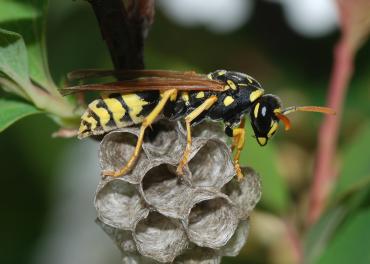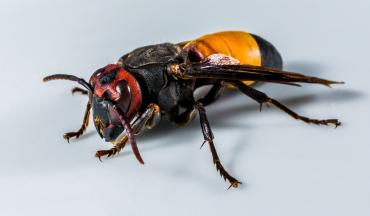It can be difficult to tell the difference between the types of stinging insects, including yellow jackets, bees, wasps and hornets. As the summer months mean children spending more time playing outside, it’s important to learn how to distinguish between wasps and hornets and the correct first aid for each type of sting.
Wasps vs. Hornets
 Wasps and hornets both belong to the Vespidae family of insects, but they each have some distinguishing characteristics.
Wasps and hornets both belong to the Vespidae family of insects, but they each have some distinguishing characteristics.
There are more than 100,000 species of wasps. They typically have long, thin legs, two pairs of wings, and can be brightly colored. There are some species of wingless wasps that are often mistaken for ants.
Typical characteristics of wasps include:
- Typically an inch long or smaller (hornets are larger)
- More aggressive than bees, but not as aggressive as hornets
- Typically social (live in groups)
- Wide variety of colors, depending on species
- Both aerial and ground nests
- Lay eggs in the body of other organisms
Hornets are technically a subspecies of wasps that have wider heads, larger rounded abdomens, and a different life cycle. Hornets are not as colorful as wasps, as they typically are black and white or brown and red.
 Typical characteristics of hornets include:
Typical characteristics of hornets include:
- Extremely aggressive
- Some species have stings that can be fatal to humans.
- Crate large aerial nests
- Live in groups
- Prey mostly on larvae and other insects
First Aid for Wasp and Hornet Stings
People with bee, wasp, or hornet allergies should always carry an epinephrine auto-injector to quickly treat a sting. If you or your child have a serious allergy to stings and are stung by a wasp or hornet, call 911 immediately.
If you or your child are not allergic to wasps or hornets, you can treat the sting at home by following these steps:
- Remove the stinger
- Ice the area for 20 minutes
- Take an antihistamine to relieve itching
- Take over-the-counter anti-inflammatory medicine to help with pain, if necessary
- Wash the area and use an antibiotic ointment to treat it
If your condition isn’t life threatening, but you would still like to consult a healthcare professional, FastMed Urgent Care is open 7 days a week to provide patients with fast, compassionate, and affordable medical care.
Check out our Health Resources Center for any other health related questions you have. Stay educated about wasps, hornets, and any other injury or illness risks your children may face this summer!
———-
Sources:
Diffen.com: http://www.diffen.com/difference/Hornet_vs_Wasp
Orkin: http://www.orkin.com/stinging-pests/wasps/difference-wasps-hornets
Web MD: https://www.webmd.com/first-aid/bee-and-wasp-stings-treatment